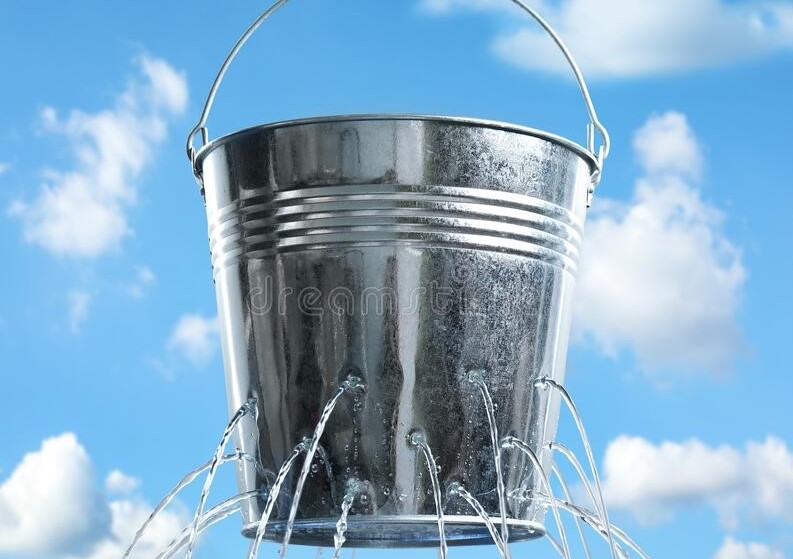3 November 2022
A Hole in the NHS Bucket
Selling paintings is not going to fill it!
By Lynda Goetz

The NHS is clearly not an efficient organisation. Like our immigration system, it is not working. It is broken. Throwing more and more money at it is not the answer, nor is the rather unhelpful suggestion, apparently made by The Taxpayers Alliance, to sell the artwork owned by a number of NHS Trusts. The fact that this artwork may be worth up to £12 million is irrelevant. Apart from the fact that this is a drop in the ocean as far as the gaping hole in NHS finances is concerned, it is in most cases not even within the rights of the NHS to sell any of it. Much of it has not been purchased out of NHS budgets but has been gifted by grateful benefactors or charitable organisations and is designed, inter alia, to cheer up those endless and frequently depressing hospital corridors. This artwork almost undoubtedly helps with the mental health both of patients and staff (and from what we hear, both groups would appear to need that help). Selling it would do very little to boost the coffers of this monolith upon which most of us rely.
Indeed, all things considered, the suggestion borders on the ludicrous. Latest figures suggest that we are spending £7 million pounds a day to house asylum seekers and immigrants who have never paid a penny into UK coffers. To put this into context, selling NHS artwork would deliver an amount that would not even pay to house asylum seekers for two days. The NHS is currently requesting an extra £7 billion to help deal with the backlog of treatments and tests which have built up since Covid. This is on top of the £136.1 billion already allocated for 2021/22 and the extra £3 billion to help with the Covid recovery. (In 2010/11 the NHS received £100.4 billion, so we are effectively talking about a forty percent increase over 11 years, although clearly inflation needs to be taken into account). During this time, patient waiting lists have got longer and the real wages of doctors and nurses have declined. The public are unimpressed and morale amongst frontline workers is at an all-time low. Why on earth does the government think that throwing yet more money at this cash-hungry institution is somehow going to solve the problems?
The answer, as we all know, is that they are terrified of the electorate and of those strident voices who bang on endlessly about ‘our wonderful NHS’. Surely it is clear by now that, although we are all immensely grateful for the existence of the NHS and the medical workers within it, some sort of reform is essential for it to survive. It is no longer, if it ever was, ‘the envy of the world’. No other country anywhere has followed our example of a ‘free-at-the-point-of-delivery’ health service. There might just be reasons for this. At risk of repeating myself, and others, the NHS was formed at a time when our population was far smaller, immigration and health tourism were not problems, and treatments, medications and technologies were less advanced. As the latter have grown more sophisticated and the former has increased*, the model we chose to use back in 1948 is no longer ‘fit for purpose’. However, because it is viewed as ‘free’ (which of course it isn’t), a change to a contribution-based model as used by most other developed countries is seen by many as unthinkable. No PM wants to be the one seen to even consider such a scheme, let alone have the audacity to implement it.
And yet it is increasingly clear to many, including some of those working within the system, that it cannot continue as it is. The latest government handout will seemingly come with an admonition to find ‘efficiencies and reforms’. Despite this, the numbers of non-medical staff appear to have increased over the years, without any increased efficiency, whilst the numbers of frontline staff are insufficient to deal with the medical needs of the population. It was pointed out recently that nurses leaving the profession would be better paid as benefits advisors. What does this say about our priorities and values?
A practising doctor who has worked in the NHS for over 20 years writing to a national newspaper this week noted that far from it being the case that we do not train enough doctors, the problem is that many no longer want to work in the NHS. He went on to say that ‘the NHS as it stands is a pipe dream. Demand needs to be curtailed by introducing charges for all with no special cases; the concept of personal responsibility reintroduced; the tax base massively broadened; and meaningful incentives introduced that will retain British-trained staff in the NHS and prevent the plundering of developing countries to make up the shortfalls. The current situation is ludicrous. How bad does it have to be before something changes?’
On the same day, in the same newspaper, another member of the medical profession wrote, ‘This winter will prove that not reforming the system simply isn’t an option’. Another contributor wrote that his daughter in Costa Rica made it to the hospital, was treated for a scorpion sting and was discharged within an hour. In his local area in Derbyshire, A&E waiting time was 28 hours. Yet another letter-writer, a few days earlier, suggested that a simple change which might ensure better face-to-face access to GPs would be to change the system of payment to them so that instead of being charged for the numbers on their list, they were paid according to the number and types of treatment. All these things need to be carefully considered, but if the pundits are right, time is of the essence and changes need to be made urgently. The time for telling people to stay at home to protect the NHS has passed. The NHS is there to help people and it cannot do it without reform.
Our MPs seem to be extremely concerned that benefits should be increased in line with inflation. They seemingly have no interest in ensuring that productive members of society such as doctors and nurses get such an increase. Small wonder then that recruitment of home-grown talent is flagging. At the top of the profession there is the cap on consultants’ pensions which has led to many taking early retirement. At the bottom end there is an overly rigid training system which gives those who do not stick closely to the hierarchical NHS dictates little or no flexibility should they gain experience abroad. Indeed, they are penalised financially for time spent gaining experience within other medical systems (unless on an officially recognised training system) and few of the possibilities which used to exist for transferring across specialties are available under the current system. Excellence is not rewarded, but mistakes are dealt with ruthlessly by the GMC, frequently bringing to an end the career of those found to have made errors of any sort.
From everything that we are hearing, this winter will test the NHS as severely as the Covid crisis did. Perhaps we need to hope that the coming crisis will persuade both the public and the politicians that ‘business as usual’ is not going to work. The hole in the bucket is almost certainly beyond mending. A new bucket is needed.
*The population then was estimated to have been some 48 million. In 2020 it was reckoned to be 68 million.


